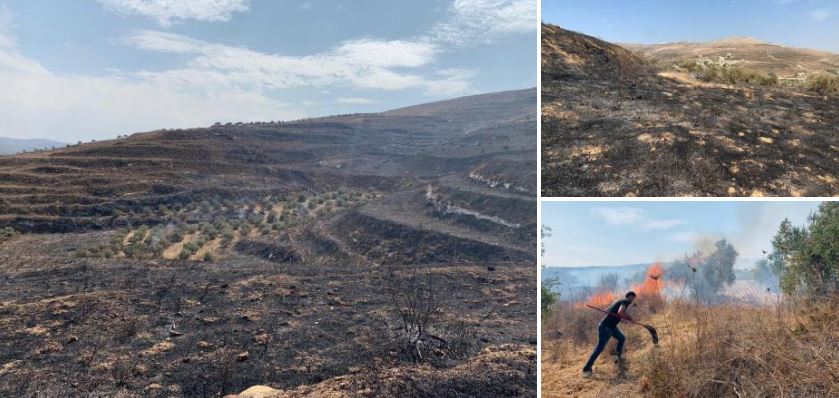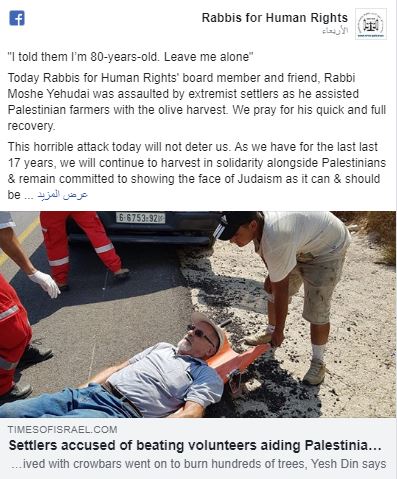Wave of settler violence kicks off olive harvest in West Bank

'The lack of law enforcement by the Israeli security forces is intentional as settler violence is seen as a privatised arm of the state'
This week, the West Bank witnessed a wave of settler attacks and agricultural terrorism as Palestinian farmers began the year’s olive harvest. Attacks were mainly in northern villages near Nablus and Salfit, governorates with the largest concentration of illegal Israeli settlements.
Wafa news reported a settler attack on olive harvesters in Burin, a village south of Nablus, on 12 October, the same day as a 55-year-old Palestinian farmer was attacked by settlers in the nearby village of Tel. Two days prior, settlers stole olives from trees belonging to farmers also in the same area.
Armed settlers attacked farmers in the village Shufa, near the city Tulkarem in the north, who threatened to shoot farmers if they did not leave their land.’
The most devastating attack occurred on the morning of 16 October when two farmers, Abdul Muhaimen Assous and Nasser Qadous from Burin, went to harvest their trees alongside 11 international volunteers.
Nearly 20 masked settler youths descended into the fields from the nearby Yitzhar settlement, attacking three internationals and seriously injuring one – including an 80-year-old rabbi from the organisation Rabbis for Human Rights.

Before fleeing the scene, the group of settlers set fire to the field, destroying more than 1,300 trees in less than one hour.
According to Ghassan Najar, 29-year-old activist from Burin, his village lost 300 trees from settler violence just the week before. In total, over 3,500 Burin olive trees have been destroyed this year by settlers, more than any year prior.
“We’re talking about 20 families [who] have lost their olive trees, which were 30 to 60 years old,” Najar told MEMO regarding the most recent incident, adding that most villagers in Burin are farmers and depend on the annual harvest as a main portion of their income.
“You can say each tree makes 300 to 500 shekel [$84-141] in oil. Especially in this season, it was a perfect season,” he explained, noting this year was clearly more fruitful than last year’s dismal olive harvest.
Eye witness reports of this latest attack in Burin described the minimal intervention by Israeli occupation forces on the scene, who only assisted in putting out the fire when it was spreading closer to the nearby settlements.
“They are very organised between the army and the settlers. [The military] does what the settlers want,” Najar said, despite the Fourth Geneva Convention declaring the responsibility of an occupying power to protect all people living in occupied territory.
According to B’Tselem spokesperson Amit Gilutz, the lack of law enforcement by the Israeli security forces is intentional as settler violence is seen as a privatised arm of the state. “We think of settler violence as violence that is promoting Israeli interests in the West Bank,” Gilutz explained, “which are to take over as much of the resources in the West Bank as possible and leave them in Israeli hands, transfer them to settlers, and to diminish the Palestinian presence in these areas.”
B’Tselem has monitored hundreds of incidents of settler violence over the years, witnessing Israeli security forces, “providing cover to settlers or not doing anything to stop them or even participating in the violence themselves.”
Gilutz could not provide a definitive trend in settler violence since the phenomenon is so wide spread and it is difficult to track every attack. But he could declare that attacks have been increasing over the past two-and-a-half years – a claim supported by a 2018 UNOCHA report.
Settler violence occurs throughout the West Bank at all times of the year in the forms of physical assaults on Palestinians, vandalising property as “price tag” attacks, or agricultural terrorism.
“In the harvest [there are] more attacks because the people are in the mountains usually every day and most of them are near the settlements,” said Najar. Most Palestinian agricultural land is located in Area C, under full Israeli military control. “This gives the settlers an excuse to attack for security reasons.”
“Attacks take place throughout the year, but the harvest season is the time where most of the internationals come,” said Erika*, an international who has been living in Burin for over two years and has assisted in four olive harvests. She herself has been attacked by settlers before and requested her identity to be concealed due to security concerns.
“We use the internationals as a witness. This is our window into the world, to show the people what is happening here,” Najar explained, emphasising how Israeli settlers extremely dislike this tactic for this reason.
The day after Wednesday’s arson attack, Burin farmers and international allies went back out into the fields to work when local settlement security came down and asked the international volunteers to leave. When they refused, Israeli military arrived shortly declaring that the only way the Palestinian farmer could continue to work is if the volunteers left.
“An international presence here is important first and foremost because all the countries that we come from have a responsibility for what is going on here,” said Erika. From New York, she stated how her own country is one of the largest donors of military aid to Israel and directly contributes to the violence of the occupation.
“We have a responsibility to come and to witness and to go home and tell people what we see.”
Source: Middle East Monitor

WRITE YOUR COMMENT